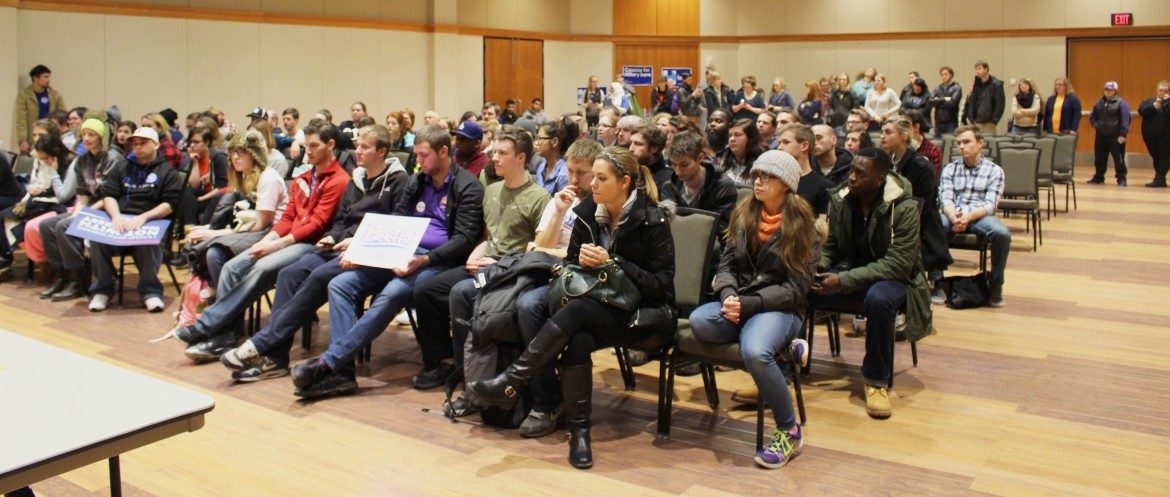By Jeff Stein and Lyle Muller, IowaWatch
A Democratic Party proposal to count raw totals during the 2020 presidential precinct caucuses is wrong in two ways, former Iowa Democratic Party chairman David Nagle said during a weekend IowaWatch Connection radio report interview. (Listen here.)
Allowing raw vote totals at the party-building events eliminates the caucus participation experience and ability to talk with people about second and third choices for delegates who support particular presidential candidates, Nagle said.
Equally important, though, allowing raw totals to count in the Iowa caucuses would put the state on a collision course with New Hampshire and its first-in-the-nation primary, he said.
“We understand their concerns,” Nagle said about election officials in New Hampshire wanting to maintain that status.
Iowa and New Hampshire Democrats and Republicans have worked together in recent decades to preserve Iowa’s first-in-the-nation caucus status and New Hampshire’s first-in-the-nation primary status.

Danielle Wilde/IowaWatch
Husband and former President Bill Clinton gives wife and 2016 Democratic presidential candidate Hillary Clinton a thumbs-up as she addresses supporters at Drake University in Des Moines, Iowa, after the Feb. 1, 2016, Iowa precinct caucuses. The couple’s daughter, Chelsea Clinton, also was at the post-caucus rally.
A Democratic National Committee Unity Reform Commission is proposing the caucus changes, among others, in its presidential candidate nominating system after complaints in 2016 from Bernie Sanders supporters upset about his narrow second-place finish in the delegate count. Other proposals include reducing significantly the number of national convention superdelegate spots. The national party’s rules and bylaws committee has taken the proposals under advisement.
Unity Reform Commission members were appointed by Sanders, Hillary Clinton and Tom Perez, the Democratic National Committee’s chairman. Jan Bauer, of Ames, represented Iowa but New Hampshire did not have a representative on the committee.
“We’re going to reach out to New Hampshire and make sure they understand that we’re still on the same wave length,” said Nagle, a former Democratic Party chairman and former U.S. congressman from Waterloo who chaired a state committee that analyzed his party’s 2016 caucuses for possible changes.
Democrats have felt pressure for a more manageable system since the first participants waiting in long lines entered crowded rooms to participate in the 2016 presidential precinct caucuses. Party leaders in 2016 dealt with missed opportunities for some registered Democrats to participate fully and, in six cases where support was tied, coin flips to determine county convention delegate commitments.
Republicans dealt with their own caucus problems in 2012, when they had difficulty determining who won their straw poll. Rick Santorum and Mitt Romney were declared winners at different times. Republicans reported no such glitches in 2016.
Christopher Larimer, a University of Northern Iowa political science associate professor, said changing rules for caucus participation will not guarantee more interest in participating. “Trust in government is at an all-time low. Approval of Congress is at an all-time low. And so, I think, until we fix the issue as far as people having a more positive orientation for government, I don’t know that changing some of these rules is going to have that big of an effect,” Larimer said in the IowaWatch radio report.
Nagle argued that the caucuses are a special event. “We meet at a specific location and a specific time, and it’s a public forum and it’s a public declaration. And there’s the opportunity of persuasion of your fellow voters. There’s a discussion,” he said.
“We talk to each other, which, in this day and age is kind of a neat thing. We’re very concerned ethat if we go to raw totals we’re going to lose that aspect of the caucus process.”
Nagle said that, overall, other portions of the proposed rules are okay.
“Leave us alone would be better,” he added.
The Iowa Center for Public Affairs Journalism is an independent, nonprofit and nonpartisan news service founded by Stephen J. Berry, a Pulitzer-prize winning investigative journalist and an associate professor of journalism at the University of Iowa, and Robert Gutsche Jr., a University of Iowa Ph.D. student and journalist who helped launch the Wisconsin Center for Investigative Journalism at the University of Wisconsin-Madison in 2009. Its first full-time executive director-editor is Lyle Muller, a veteran Iowa journalist whose experience included serving as editor of The Gazette (Cedar Rapids, IA). He joined the Center in May 2012.





